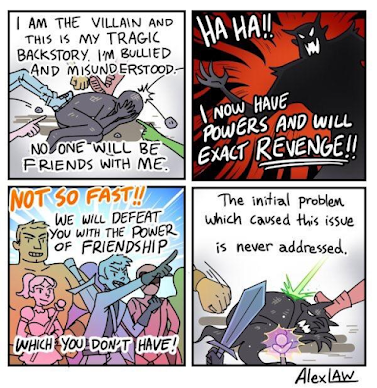The Path of Peace
"Well, I don't want the BBEG to be defeated with a single roll."
Then think of a way to draw it out. How many successes are needed? Each success prevents combat for a few rounds, as the PCs try to work on the opponent's resolve.
But it goes beyond this. In 1st edition Mummy (World of Darkness), they discussed what a character with higher-than-human social charms could do (in D&D, we'd go with Charisma).
(7) The character can make suggestions which cause her victim to perform impulsive actions. The victim is allowed a resisted test between the Mummy's Manipulation and victim's Willpower. Even if influenced into action by the Mummy, the victim can still spend a Willpower point to resist actions which would cause physical self-injury.
(8) Characters with Manipulation Attributes of eight wield a most invasive power. Through sustained conversation with another, the character is able to change his victim's most basic belief structure. Unless the victim wins a resisted Willpower roll against the Mummy's Manipulation Attribute, the victim's Nature will be changed to an Arche- type of the Mummy's choosing. Alternatively, the Mummy may use this power to send a Vampire or Garou into Frenzy or give the victim any one Derangement (this requires the Mummy to also succeed in a Psychology roll versus the victim's Truth or Self-Control Virtue).
The idea that someone could alter a person's entire world-view with a conversation was a fascinating concept, and was our first introduction to social combat. Then of course, you had Legend of the Five Rings 1e/2e with the courtier, magistrate, and emissary classes, and the entire social combat system built into 7th Sea 1e. With these, the idea that you could get through a conflict without resorting to violence cemented itself as a viable path - regardless of RPG.
Bringing this around to d20.
Well, here's the thing. There's already reams of pages on combat, damaging spells, weapons, and so forth in D&D and almost nothing to cover the non-combat side of things. So, what if a player were to want to do something equivalent, but on the social side of things?
A Paladin's Smite, but it hits the person emotionally, not physically - causing them to question their life choices and feel remorse for past transgressions?
A druid whose magic instils in an opponent a deep bond with nature, causing them to want to protect and nurture the plants and animals in the region?
What would the social equivalent of Meteor Swarm be?
How about a spell which can permanently shift Alignment one step?
In 13th Age, we wrote up rules for social combat. PCs had a social hit point pool, and if you wished to make a social-based character, you could take any class that you wished, and all attacks aimed at the social pool instead of the physical pool. Defences protected your social hp, or could create 'barriers' that stopped social attacks from getting through.
It worked fairly well, in fact.
"Some people can't be convinced".
Sure. But that's before you start to bring magic and supernatural arts into it. Some creatures can't be hurt by mundane weapons, but cast a spell or use a magic sword or special class ability, and they get hurt just fine. The same rules should apply to the art of persuasion.
"I don't want the BBEG fight to be replaced with the PCs talking."
So what? It's the player's game as much as the GM's, and if the players want to try to bring the enemy over to the cause of good, let them. Things can get pretty dicey afterwards - the villain may want to turn over a new leaf, but do the survivors of the enemy's actions want to accept that redemptions? Are the PCs going to try to protect the enemy now that they're on the side of Good?
If Darth Vader hadn't died - do you think the Rebellion would have accepted him just because he threw Palpatine down a shaft?
Anyway, our point is - the path of the word should be just as viable a tactic as the path of the sword - and not just for dealing damage.


Comments
Post a Comment